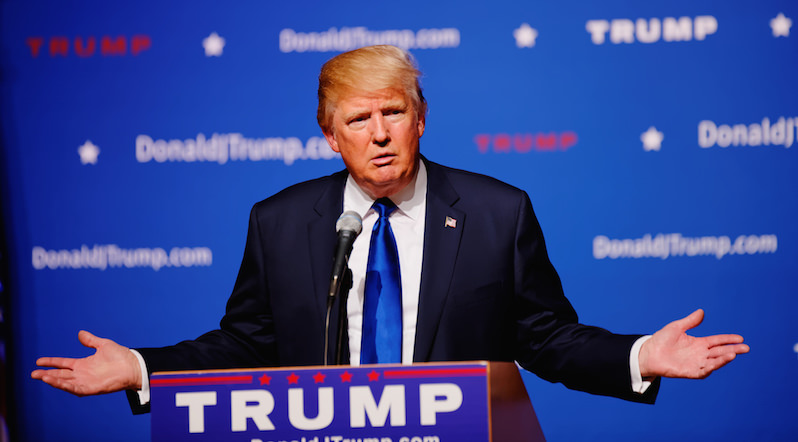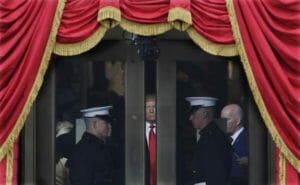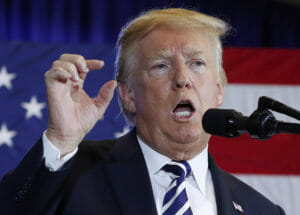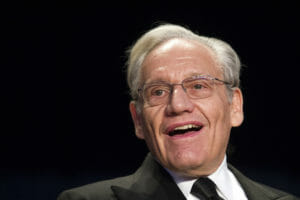The ‘Never Trump’ Movement Is Gaining Momentum, but the GOP’s Disrupter Is Far From Finished
Reports of the Republican front-runner's demise are premature, and they may be the product of wishful thinking. The Donald Trump juggernaut is hard to stop -- no matter what he says or does. (Michael Vadon / CC BY-SA 2.0)
The Donald Trump juggernaut is hard to stop -- no matter what he says or does. (Michael Vadon / CC BY-SA 2.0)
WASHINGTON — Not so fast, everybody. To paraphrase Winston Churchill, Wisconsin will not be the end of Donald Trump. It will not even be the beginning of the end. But it might be the end of the beginning.
To be sure, Trump had a terrible, horrible, atrocious week. But imagine the worst-case scenario for him: He wins none of Wisconsin’s 42 convention delegates in Tuesday’s primary, while his nearest rival, Ted Cruz, wins them all.
Even with that improbable result, Trump would have a huge lead over Cruz in the delegate race, 736 to 505. A Wisconsin shutout would make it more difficult for Trump to reach the magic number of 1,237 — an absolute majority, sealing the Republican nomination. But it would remain nearly impossible for Cruz to get there.
Meanwhile, the next states to vote — New York on April 19; Connecticut, Delaware, Maryland, Pennsylvania and Rhode Island on April 26 — look like much friendlier terrain for Trump than for Cruz or John Kasich. In the primaries where the two biggest delegate hauls are at stake, Trump leads Cruz by 34.3 points in New York and Kasich by 18 points in Pennsylvania, according to the Real Clear Politics polling averages.
So reports of Trump’s demise are surely premature. Once again, I’m afraid, they may be largely the product of wishful thinking.
At some point, I have to believe, someone will tell Trump what he thinks about abortion. He took four or five different positions on the issue last week, beginning with the startling assertion, in an interview with MSNBC’s Chris Matthews (on whose show I often appear), that if abortion were illegal, as Trump says it should be, women who have had the procedure should face punishment.
Trump’s campaign quickly took that back, contending that the hirsute billionaire meant to say that the doctors who perform abortions should be punished. The campaign also rushed to take back Trump’s statement to CBS’ John Dickerson, a couple of days later, that “the laws are set” on abortion and “I think we have to leave it that way.”
A spokeswoman said that what Trump meant was that the laws were set “until he is president,” at which point he will change them. “There is nothing new or different here,” the spokeswoman gamely maintained.
Trump also gave a lengthy interview to The Washington Post’s Bob Woodward and Robert Costa in which, among other things, the candidate predicted a “very massive recession,” absurdly promised to eliminate the $19 trillion national debt “over a period of eight years” and compared himself to both Muhammad Ali and Vince Lombardi.
And Trump struggled all week to explain how he could be against nuclear proliferation but also say he wouldn’t be perturbed if Japan and South Korea built their own nuclear weapons as a deterrent against North Korea. I’m not actually sure he understands what “proliferation” means.
The Republican establishment is aghast, but what’s new about that? Trump’s whole campaign has been a string of gaffes that would doom a traditional politician but leave him with nary a scratch. How many times do his hardcore supporters have to tell us that they’re not looking for a traditional politician?
The biggest thing a loss in Wisconsin would do is focus attention on the nuts and bolts of the delegate count. That’s why I say this week might be the end of the beginning: The battle could now shift into trench warfare.
The “Never Trump” movement is predicated on keeping Trump’s delegate count short of 1,237. The idea is that if he can be denied on the convention’s first ballot, delegates will then be free to change their allegiance — perhaps to Cruz or Kasich, perhaps to some respected Republican who is not even in the race, such as House Speaker Paul Ryan.
The Cruz campaign is making a concerted effort to ensure that the individuals chosen as delegates at state and local party gatherings are Cruz supporters. Many of them will be bound to vote for Trump on the first ballot, perhaps even the second, but then could switch. Trump has his own team out there trying to hand-pick delegates to his liking, but he’s playing catch-up.
But here’s my question: Seriously?
If Trump comes to Cleveland a few delegates shy of a majority, I find it hard to believe the party is going to tell primary voters, “Thanks for your input, but we don’t care what you think.” Sorry, but I just don’t believe the GOP has the fortitude to divorce its angry, energized base.
Your support matters…Independent journalism is under threat and overshadowed by heavily funded mainstream media.
You can help level the playing field. Become a member.
Your tax-deductible contribution keeps us digging beneath the headlines to give you thought-provoking, investigative reporting and analysis that unearths what's really happening- without compromise.
Give today to support our courageous, independent journalists.





You need to be a supporter to comment.
There are currently no responses to this article.
Be the first to respond.